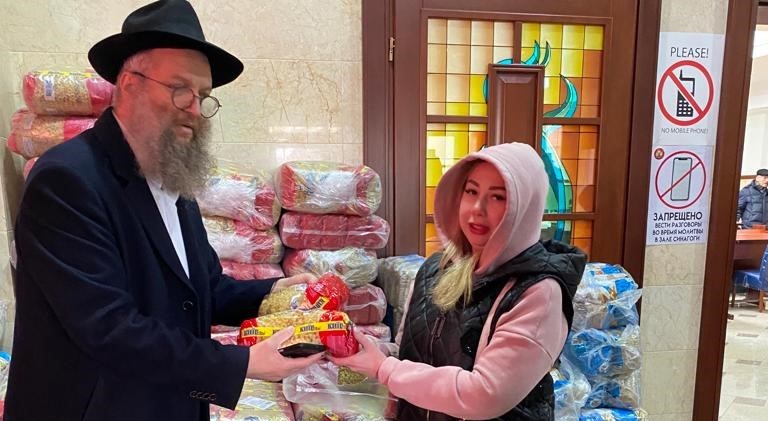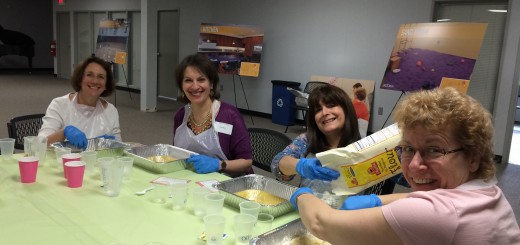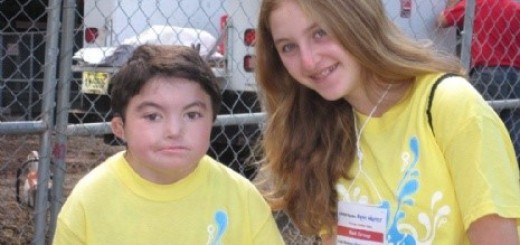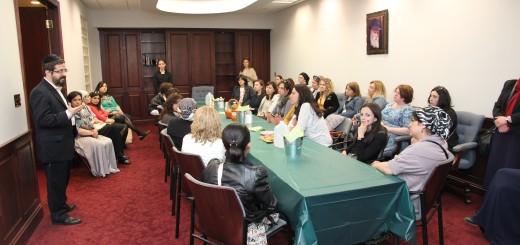Rescuing Zaporizhzhia: A first-hand account from Ukraine

By Rebecca Gelman and Johanna Ginsberg
Rabbi Nochum Ehrentreu and his wife Dina of Zaporizhzhia, Ukraine, found themselves on the front lines of the war of Ukraine in late February. When the first bombs began to fall on their hometown, the Ehrentreus sprang into action, providing shelter and warm meals. They took 5 families into their home.
As residents knocked on the doors of their synagogue seeking refuge from the bombings, dozens of families filled the basement and, as more people arrived, they filled the sanctuary and other rooms.
The Ehrentreus have lived in Zaporizhzhia, an industrial city in southeastern Ukraine on the Dnieper River, with a population of 722,713 people and about 10,000 Jews, for nearly 25 years. They moved there as Chabad emissaries from Israel and built the community from the ground up.
On March 30, at the Orbach home in Livingston, Rabbi Nochum Ehrentreu shared his experience in Ukraine when the shelling started in Zaporizhzhia. The evening was organized by Friendship Circle.
“In the midst of so much darkness and war, the Ehrentreus have found a way to bring light, first taking care of people in the midst of the bombing, then helping others to escape the region with them, and now working diligently to rescue as many people as they can from their town,” said Rabbi Zalman Grossbaum, CEO of the Friendship Circle of New Jersey.
Once the shelling started, bombs fell at a ferocious pace, according to Rabbi Ehrentreu. The Ehrentreus, and the families living with them, were “terrified,” he said. “We were sure we were going to die,” recalled Dina. On March 3, Russian forces shelled the Zaporizhzhia Nuclear Power Plant, one of the largest nuclear power stations in Europe.




Despite the risk, Rabbi Ehrentreu, who had had the foresight to order truckloads of food before the shelling started, drove through town, along with members of the synagogue staff, delivering packages to the elderly and people who were house bound. At one point, mistaken for a Chechen soldier at a checkpoint, he found himself in grave danger.
Ukrainian soldiers surrounded him, he recounted, shoot in the air and at his car. They then dragged him out of his car and threw him to the ground, beating him with their rifles. He begged them to look in his truck so they would see he was just a rabbi carrying provisions for his synagogue, they instead took him at gunpoint to the local headquarters. Luckily, upon arriving, he was greeted by a would-be interrogator who recognized him. Instead of the rough treatment the rabbi had been expecting, he received a warm hug, and just one question: “Rabbi Nochum, what are you doing here?” he recalled the soldier asking.
After the first week or so of shelling, the Ehrentreus held a meeting with the families they had been housing, and convinced the group that they needed not only to escape from Zaporizhzhia but to leave Ukraine altogether.
Trauma played its role in that painful decision. “I did not want there to be another Holocaust,” said Dina. Those families spread the word to their relatives and friends and by the time they left, their group numbered one hundred and twenty people. The Ehrentreus recalled crying as they left behind the people in the community who could not join them, and the Torah scrolls that remain in the synagogue.



They traveled at first by train. Rabbi Ehrentreu described a scene of pushing and shoving to get on the train. “I can’t describe the difficulty of the emotional distress,” he said. The harrowing passage lasting over 24 hours, in a train car crammed with men, women, children, cats, and dogs, with no bathrooms, no lights and warnings to use no cell phones.
Still, they made it to Poland and then on to Israel.
The Ehrentreus now spend their time sending supplies, food and medicine into Zaporizhzhia and helping others escape out of Zaporizhzhia. So far, they have rescued 850 people, now using chartered buses instead of trains. They then care for the refugees to make sure that they have food and shelter.
“Arriving in Israel was the most moving moment of my life,” said Nachum. You can help the Ehrentreus save lives by contributing to their effort at charidy.com/zaporizhzhia.



